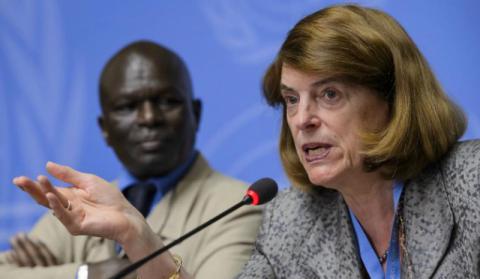
On 29 June 2015, the United Nations Independent Commission of Inquiry on the 2014 Gaza Conflict (CoI on Gaza) presented to the Human Rights Council (HRC) the conclusions of its inquiry into violations of International Humanitarian Law (IHL) and Human Rights Law (HRL) in the Occupied Palestinian Territory (OPT) in the context of the Operation "Protective Edge." Concluding that the information gathered was "pointing to serious violations" by both parties which "may amount to war crimes," the Commission called upon all duty bearers to implement all the recommendations previously made by various UN bodies, noting that their persistent lack of implementation "lies at the heart of the systematic recurrence of violations in Israel and in the Occupied Palestinian Territories."
Following the launch of Operation "Protective Edge" on 8 July 2014, the HRC decided to dispatch a commission of inquiry to "examine alleged violations of international human rights and humanitarian law occurring between 13 June and 26 August across the Occupied Palestinian Territory" (Resolution S21-1). Based on interviews with victims and witnesses and written submissions from a wide range of sources, including Alkarama's last public report on Operation "Protective Edge", and despite the refusal of the Israeli authorities to cooperate, the CoI on Gaza concluded that "the scale of the devastation was unprecedented" and that "as Palestinians struggled to find ways to save their own lives and those of their families, they were confronted with intense attacks [...] having 'no safe place' to go."
As the third major offensive on Gaza in six years, the CoI members also identified new patterns in the 51-day operation during which the Israeli Defence Forces (IDF) carried out more than 6'000 air strikes, "notably attacks by Israel on residential buildings resulting in the death of entire families." In particular, they found that the use of precision-guided weapons indicated that "they were directed against specific targets" and that the timing of the attacks, "often in the evening or at dawn when families fathered for iftar and suhhur, the Ramadan meals, or at night, when people were asleep" increased the likelihood that entire families would be at home.
What is more, the CoI highlighted that "a reasonable commander would have been aware that these attacks would be likely to result in a large number of civilian casualties" and that in addition, the IDF "may not have done everything feasible to avoid or limit civilian casualties" since no effective advance warning were given. In particular, when the IDF used "roof-knock" warnings – small strikes before the real one –, the CoI noted that often the persons did not understand that their house was hit or the time given for evacuation was insufficient.
In light of these facts, the Independent CoI on Gazaconcluded that these targeted strikes against residential buildings amount to violations of the three core principles of IHL – namely that of distinction, proportionality and precaution – and therefore may amount to war crimes. Going further, the independent experts noted that the Israeli military tactics was "reflective of a broader policy, approved at least tacitly by decision-makers at the highest levels of the Government of Israel" and that it may be that the military policy "itself violates the laws of war."
The CoI on Gaza thus called upon all parties to promptly establish accountability mechanisms and to indict, prosecute and convict those responsible for international crimes, as well as to urgently cooperate fully with the preliminary examination of the International Criminal Court (ICC). During the interactive dialogue, the Commission Chair Mary McGowan Davis raised the case of the four Palestinian boys killed on Gaza beach in July 2014 "which reappeared on the world stage recently given the disappointing results of a Military Advocate General investigation" as illustrating "one of [their] key messages: the need to have effective accountability mechanisms on all sides." "There is concern that in his analysis, the Military Advocate General incorrectly applied international humanitarian law by reversing the presumption of civilian status in case of doubt," she continued.
After the Commission members presented their findings to the Human Rights Council (HRC), Palestine and Israel were invited to take the floor. While Israel was absent during the interactive dialogue, the State of Palestine found the report to be "balanced to a great extent" reflecting "the professionalism and neutrality of the Commission." However, according to the Palestinian delegate, "the report mentions in absolute terms the violations committed by Palestinian armed groups" but does not do so when qualifying the violations committed by the IDF "although the conflict itself is unbalanced, with one side under occupation by the other."
While the CoI on Gaza recommended that the HRC consider conducting a comprehensive review of the implementation of the numerous recommendations addressed to the parties by its own mechanisms – including the CoI and other fact-finding missions –, it is yet to see if the Israeli and Palestinian authorities will demonstrate political will by taking the Commission's guidance into account as to avert such a conflict in the future.
For more information or an interview, please contact the media team at media@alkarama.org (Dir: +41 22 734 1008)
